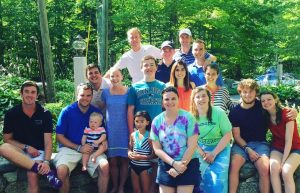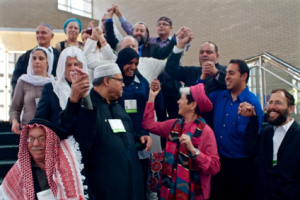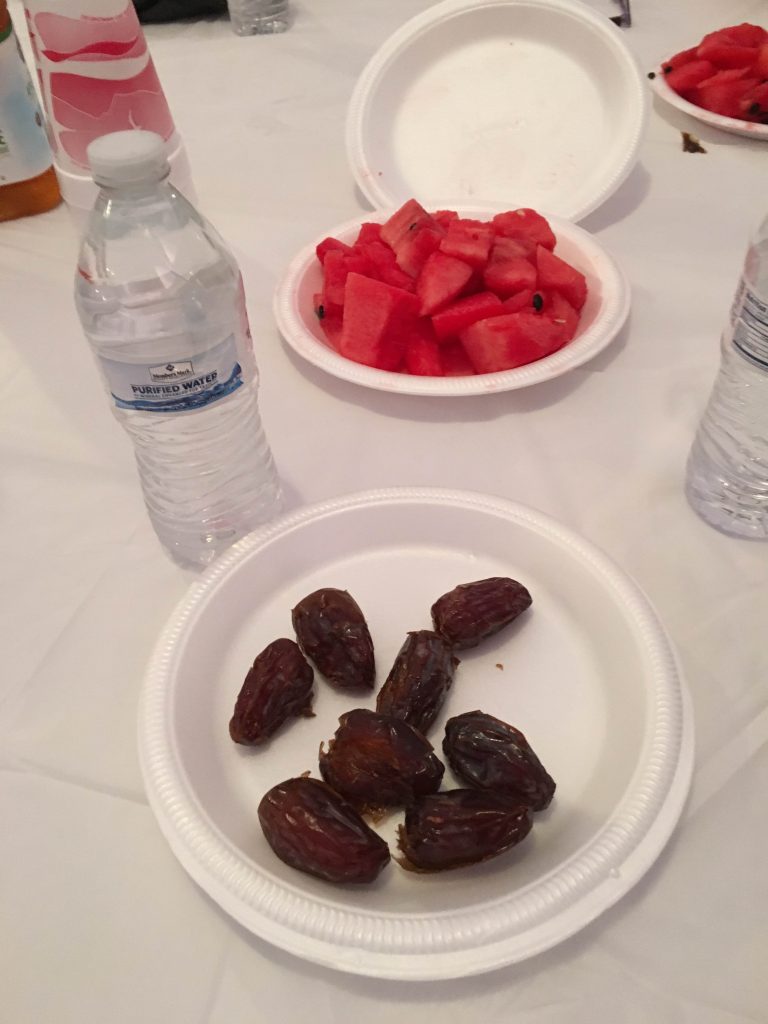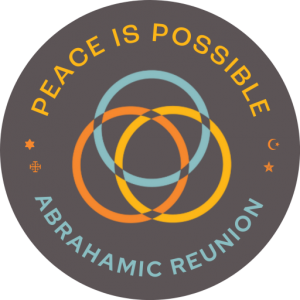A Worldwide Family Reunion
August 9, 2016
This blog is a bit late because I took time off for a family reunion, but now I’m back in the office and working again. I managed to connect to the internet long enough to keep up with my daily quotes each day, although on one of the days I had to text Chris the quote and ask him to post it for me.
The reunion got me thinking about the importance of family. I am extremely fortunate, because my family is very close. We have gone through some hard times together, but have always been supportive of each other.
I started thinking about the role of family in religious life, and looked into what the different texts had to say about it. Of course there is the commandment to “Honor thy father and mother”, but I wanted to know about extended family. I was surprised by how hard it was to find references to it.
As I searched, I came across the lists of genealogical descent in the Torah. In the beginning of the Christian Gospels, there is a similar list tracing the genealogy of Jesus. Both religions trace their roots back to Abraham. The Quran does not have such a list to trace Muhammad back to Abraham, but according to Muslim tradition, he is a descendant of Ishmael, one of Abraham’s sons. In all three religions, this connection with Abraham is important, and this is what brings the religions together. They all come from the same source, and so they are all part of the same family. They may be cousins of each other but, as my family reunion proves, extended family is just as important as immediate family.
Instead of fighting with each other, these three related faiths should support each other, since this is what families are supposed to do. Sure, disagreements may arise, since no family is perfect. But in the end, kinship is too important to be broken. In fact, “The one who cuts off the ties of kinship will not enter Paradise” (Saheeh Muslim). I am in no way claiming to be an expert on these things, but it seems to me, logically, that if Judaism, Christianity, and Islam are one large family, then no one can cut off ties with the other.
Judaism and Christianity take the time to trace every step of their lineage, proving they are related to Abraham. Surely family is important if they go to such lengths to prove it. And as I have just shown, family is so important in Islam that rejecting it automatically keeps someone out of Paradise.
And our connection goes back to before Abraham. We are all, ultimately, God’s children. And we all share a commandment to treat each other kindly. Judaism says “The stranger who sojourns with you shall be as a native from among you, and you shall love him as yourself; for you were strangers in the land of Egypt. I am the Lord, your God.” (Leviticus 19:34). The Christian Bible says “Keep on loving one another as brothers and sisters. Do not forget to show hospitality to strangers…” (Hebrews 13:1-2). Islam says that “None of you has faith until he loves for his brother what he loves for himself” (Sahih al-Bukhari 13). “Brother” in this case includes all of humanity.
These commands, to treat strangers with kindness and to love each other as family, show that God’s concept of family extends to all people, regardless of religion. In the end, we are all part of the family of God. There is no reason for violence and hatred between anyone. We are one family, and we need to act like it.
Creating Unity on College Campuses
July 27, 2016
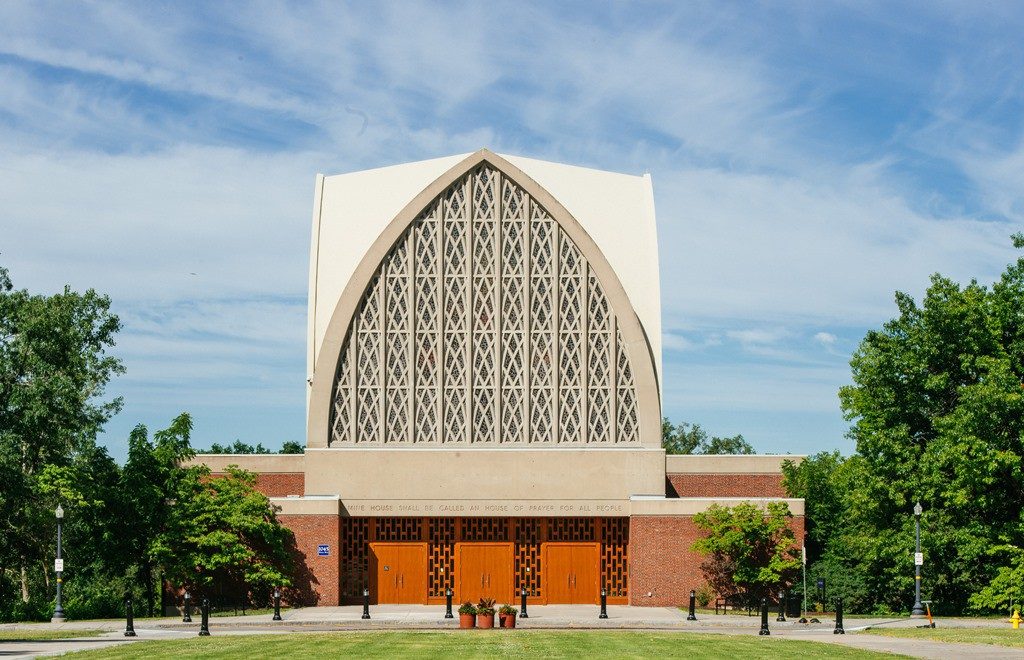
My school’s Interfaith Chapel, where all faith groups can hold events and be in dialogue with each other. The writing above the doors says “Mine house shall be called an house of prayer for all people”
This past week, I started a new project, which will be my main focus for the rest of my internship. I am creating a kit with information and resources for college students who are interested in fostering interfaith dialogue on their campuses. On my own campus, I have seen events like “Palestinian Awareness Month” and “Israel Awareness Week” (the length of time was decided by the groups, and is not a reflection of my school’s views). What I’ve noticed is that these events create more division than unity. The campus becomes more polarized and tensions rise.
I’ve also noticed that there is a lack of events that bring all sides of the conflict together. When these events do occur, they are on a much smaller scale, and most of the campus does not even know they are going on. There is no “Holy Land Week” or any large scale events to connect people. And while these small, occasional gatherings are a good thing, it is not enough to create change on my campus.
I’ve been planning to start a new group on my campus to fix this problem. It’s not a replacement for the interfaith group that already exists on my campus. This group will be more focused on the Holy Land and bringing people from all backgrounds together in peace, much like the Abrahamic Reunion does.
As I am developing this kit for campuses that want to start similar groups, I am basing it off of my own college experience. I am addressing the questions I have been asking myself already, like “Who do I contact? What topics should I discuss? How do I spread the word?” It has been extremely helpful for me with my own plans, and will hopefully be just as helpful for other campuses.
College is an incredibly important time for developing one’s ideas about the world. It is a time to discover new ways of thinking and be exposed to different viewpoints. Campus climate shapes those views. A college campus that is divided promotes opposition and aggression against the so-called “other side”. When the student graduates, this is the attitude they will carry into the world, creating an obstacle to the peacemaking process. Imagine what would happen if they brought a desire for peace instead. If groups like these can create unity through dialogue on campuses, students would graduate with an understanding and acceptance of other views. It would shape a generation of people ready to listen to each other and work together for peace.
As Mahatma Gandhi said, “Our ability to reach unity in diversity will be the beauty and the test of our civilization”. These kits would help create that unity for my generation and thus civilization in general.
In the fall, when I go back to school and start my senior year, I will be the lab rat, testing the kit, seeing what needs to be added, and seeing if such a group can thrive on campuses. I think that it can, but it takes some effort and guidance, which is what I hope these kits will be able to provide. I think these kits will be able to help change the dialogue that goes on at any college in the country.
Have ideas of things that could go into a kit? Want to start a project on your own campus? Contact me at intern@abrahamicreunion.org
My First Ramadan
July 19, 2016
The month of Ramadan ended earlier this month, and I’ve spent the last two weeks reflecting on all that I learned. I experienced Ramadan for the first time this year. I knew that it was the month that Muslims believe the Qur’an was revealed to the Prophet Mohammad. I could tell you what happens during the month, and give you facts about it, but I didn’t truly understand it, since I had never been a part of it.
That changed here in Sarasota. Attending an iftar is something completely different from reading about one or talking about one. I had been to a mosque once before, but I was one in a group of visitors, so it was impossible to truly experience Islam. This time, I was the only non-Muslim there. I was immediately welcomed with open arms and called “sister”. The women made sure I was comfortable and answered any questions I had about what was going on. I felt like I was a part of their community, and was able to experience the joy that comes from that in a way I never had before.
My second iftar, at West Palm Beach, was another brand new experience. I wrote about it in my last blog, but I didn’t mention that it was the first time I fasted for the day as well. I’ve fasted before, but never without water, so I was nervous about how I would do. I expected to spend the day thinking about how thirsty I was. I was surprised when that wasn’t the case, although there were definitely a few times when I really wanted water.
By fasting, I was able to enjoy that night’s iftar so much more. It was a completely different experience, because I truly appreciated the food and water and what it means to fast. I also gained an enormous amount of respect for the Muslims that fast every day for the whole month.
Fasting is more exhausting than I expected. I spent the entire ride to West Palm Beach yawning, and now I know why people sleep a lot during the day during Ramadan. I understand why Sheikh Ghassan had to get work done earlier in the day, before he got too tired. The day after Ramadan ended, I could immediately see the difference in his energy. The fact that he could drink coffee again probably helped too.
By participating, I also began to understand the reason for the fast. I felt closer to God that day than I had for a very long time. I don’t know what exactly it is about fasting that did it, but something happened that day that strengthened my connection with God. Now I can see what people mean when they say that fasting during Ramadan refreshes their relationship with God.
The next iftar was the very next night, and it was very different than all the others. It was Ghassan’s son’s birthday, so we had a pizza iftar at Chris’s house. Chris bought dates so we could still break the fast in the traditional way. After pizza, we had ice cream and sang happy birthday. Since my birthday was the week before, they sang to me too. It was nice to experience an informal iftar with people I’ve come to see as my family here in Sarasota.
My last iftar this year was back in Sarasota again, at last Sunday’s interfaith iftar. I didn’t fast that day, because my hands shake when I don’t eat, and I was in charge of the camera. This time all of the guests were led on a tour of the mosque, where any questions we had about Ramadan or Islam in general were answered. There I learned that since the Abrahamic religions come from the same source, many Muslims study Judaism before studying Islam itself. Afterwards, we shared the iftar meal together, and it was an entirely new experience. People of all different faith backgrounds were sitting together, talking and getting to know one another. Slowly, barriers began to melt away, as we all realized how much we truly have in common. It was the last iftar I attended this Ramadan, and it was the perfect way for me to end it.
Each iftar taught me something new about Ramadan, something no book could have ever taught me. The first iftar taught me how it feels to be part of that community, praying and eating together. The second one helped me understand the importance of fasting, and how it can strengthen one’s relationship with God. The third iftar showed me how beautiful it is when people come together, listen to one another, and grow to love each other.
This Ramadan was an incredible experience, and I know it is only the beginning. I have so much more to learn during my internship with the Abrahamic Reunion, and for the rest of my life after that.
Peace, Salaam, and Shalom
July 1, 2016
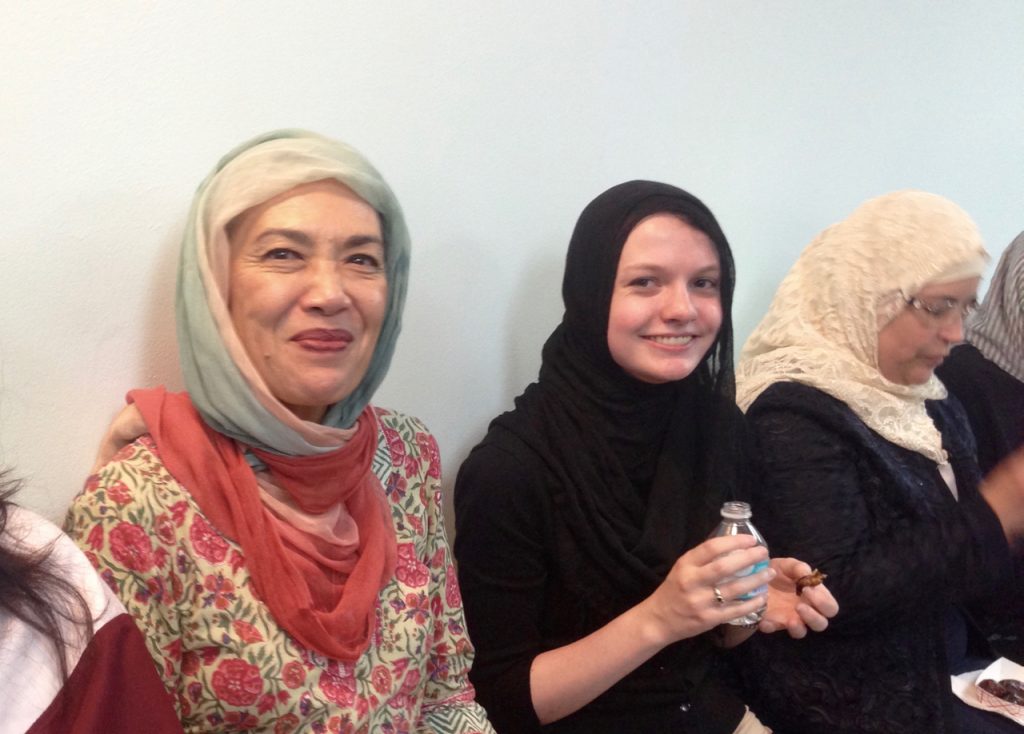
*Disclaimer – Katie, pictured center, is not a Muslim – but she did wear a scarf for the interfaith Ramadan dinner in West Palm Beach
My name is Katie, and I have been working as an intern for the Abrahamic Reunion in Sarasota, Florida for about two weeks now. I’m still not entirely sure how I ended up here. At the Parliament of the World’s Religions I started talking to a man named Rabbi Yakov Nagen, who told me he was part of some group called the “Abrahamic Reunion”. Curious, I decided to check out one of the group’s presentations. After listening to some of the amazing things this group was doing, I fell in love with the organization. I started thinking about ways I could bring that spirit to my own college campus.
In March, I emailed Rabbi Nagen and asked if there were any opportunities for me to work with the Abrahamic Reunion this summer. He passed my email along to Chris Miller in Sarasota. We exchanged some emails, a couple phone calls, and one conversation on Skype. The next thing I knew, I had packed my bags and was on a flight from my small hometown in Upstate New York to spend the summer as an intern in a place where I knew absolutely no one. I probably should have been more nervous, but I knew that this was what I was supposed to do.
I’ve been kept very busy these last two weeks, and I’ve been able to start a few projects of my own. One of them is a daily quote on the Facebook and Twitter pages. Every day, I will be posting a quote about interfaith cooperation and the spirit of unity. Chris challenged me to keep it going for an entire year, long after I go back to New York. I started on June 27, 2016, and I officially accept his challenge to post every day through June 26, 2017.
The last two weeks have only strengthened my resolve that this is where I am meant to be this summer. Chris and Sheikh Ghassan have been absolutely incredible to work with, and I am already learning so much from them. There is always something exciting going on. In my first week alone, I went to a Universal Worship Service, an interfaith vigil that the Abrahamic Reunion organized for the victims of the Orlando shooting, an Iftar at the local mosque, and a Friday evening Shabbat service at a local synagogue.
Last Friday, we went to an interfaith Iftar at a mosque in West Palm Beach. It was amazing to get to hear leaders from many different faith communities, and to feel the love and acceptance in the room. There was something about it that was impossible to capture, no matter how many pictures I took. Being with so many people, from so many different faith backgrounds, all united for a common purpose, is truly a unique and beautiful experience. I hope that it becomes something that everyone can experience. I am truly fortunate to be working with the Abrahamic Reunion, where I feel that spirit of compassion and unity every day.

